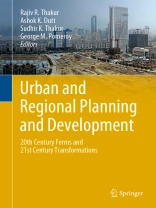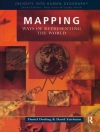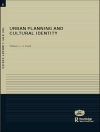This book discusses urban planning and regional development practices in the twentieth century, and ways in which they are currently being transformed. It addresses questions such as: What are the factors affecting planning dynamics at local, regional, national and global scales?
With the push to adopt a market paradigm in land development and infrastructure, the relationship between resource management, sustainable development and the role of governance has been transformed. Centralized planning is giving way to privatization, not only in the traditional regions but also in newly emerging regions of Asia, Africa and Latin America. Further, attempts are being made to bring planning related decision-making closer to the people who are most affected by it.
Presenting a collection of studies from scholars around the world and highlighting recent advances in the field, the book is a valuable reference guide for those engaged in urban transformations, whether as graduate students, researchers, practitioners or policymakers.
Tabella dei contenuti
Urban and Regional Planning and Development: Introduction and Overview.- Frank J. Costa: Professional Career and Contributions.- Regional Development and Planning.- Forty Years of Urban and Regional Development and Planning in China.- Urban and Regional Development and Planning in India’s Five Year Plans: Patterns and Emerging Policy Issues.- South African Urban Planning in the 20th and 21st Centuries – Continuities between the Apartheid and Democratic eras?.- A Reappraisal of Spatial Planning in Botswana.- What and Where are We Tweeting about Black Friday?.- Remaking ‘Urban’ in 21st Century Neoliberal India.- Confronting Styles and Scales: Normative vs. Participative Planning in a Twentieth-Century Colonial Setting.- Structural Gaps within a Country: The Socio-Economic Development of Cities in Ecuador.- Exploring Urban Dynamics in the Network Space.- Spatiotemporal Analysis of Shooting-Arrest Interaction in Houston.- Ecological Regional Planning: An Approach of the Protected Areas and the Environmental Services in Costa Rica.- Remaking ‘Urban’ in 21st Century Neoliberal India.- Confronting Styles and Scales: Normative vs. Participative Planning in a Twentieth-Century Colonial Setting.- Structural Gaps within a Country: The Socio-Economic Development of Cities in Ecuador.- Exploring Urban Dynamics in the Network Space.- Spatiotemporal Analysis of Shooting-Arrest Interaction in Houston.- What and Where are We Tweeting about Black Friday?.- Geographies of Indian Women’s Everyday Public Safety.- Land Use Change Outside Dhaka Metropolitan Area: An Analysis of Factors from Physical, Socio-Economic and Institutional Perspectives.- Consequences of Unplanned Growth: A Case Study of Metropolitan Hyderabad.- Slum Upgradation and Improvement through Slums Vulnerability Assessment (SVA) in Delhi.- Remodelling Urban Villages in Delhi: The Overriding Role of Transportation Lines.- Regional Differentials in Transformation of Dalits in Northwestern India.- Land Use Planning Policies and Gentrification in U. S. Cities.- State-led Urbanity: Reexamining Modern Movement Servicescapes.- Urban Governance under Neoliberalism: Increasing Centralization vis-a-vis Participatory Decentralization.- Changing Trajectories of Urban Governance and Participatory Urban Development in India.- Politics and Ethics in the Process of Plan Preparation and Implementation.- Participatory Comprehensive Planning of Amphawa District, Thailand.- Infrastructure and Regional Development in India: Spatial Linkages and Policy Implications.- Tourism and Urban Development in Chennai, India: An Exploratory Spatial Data Analysis.- Knowledge and Skills for India’s Urban Transformation-High Growth Period for Urban Planning.- Intermediary Cities of Refuge: From Istanbul to Kolkata.- Return Migrants as Force to Urban Transformation – A Case Study from Poznan, Poland.- Leveraging Brewing History: The Case of Cincinnati’s Over-the-Rhine Neighborhood.- Sustainable Cities in the Global South:Lessons from the African Continent.- Growing Sustainable Transportation in an Autocentric Community: Current Trends and Applications.- Sacred-Heritage City Development and Planning in India: A Study of Banaras and Ayodhya.- An Assessment of Preservation Planning Activities in Pennsylvania Municipalities Using the Historic District Act.
Circa l’autore
Rajiv R. Thakur is Associate Professor of Geography and Chair of the Department of Geosciences at Missouri State University, West Plains. He was previously faculty at University of South Alabama and the University of Tennessee. He has published and presented within the context of urban and regional economic development and is exploring new research at the intersection of economics and environment through the lens of sustainability. He went on to become Chair of the West Lakes Division of the American Association of Geographers. Since 2018, he has served on the editorial board of Asian Geographer. He holds a Ph D in Geography from the Indiana State University, MA in Geography from the University of Akron and an MA in Political Science from the University of Delhi.
Ashok K. Dutt is Professor Emeritus of Geography, Planning and Urban Studies at University of Akron where he was a founding member of the Asian Urban Research Association (along with Allen G. Noble, Frank J. Costa and Lawrence J.C. Ma). Dr. Dutt has established his international credentials working on urban and regional planning issues in Asia, Europe and North America and has enriched both its theory and practice through his insights. Dr. Dutt’s research interest include urban, social, cultural, medical, population, economic, and development geography. He is the author of numerous articles, book reviews, and books including Urbanization and Planning in India: Vehicles of Modernization (1978), Public Planning in the Netherlands (1985 coedited with Costa), Urbanization in Asia (1989 coedited with Costa, Ma and Noble), Challenges to Asian Urbanization in the 21st Century (coedited with Noble, G. Venugopal, and S. Subbiah). He is currently working on an edited book, Environment, Development and Culture in South and East Asia: Local, Regional and International Perspectives (with Rajiv Thakur, Stanley Brunn, Baleshwar Thakur and Ramesh Dhussa).
Sudhir Thakur is Professor in the Finance, Insurance and Real Estate (FIRE) department at the College of Business Administration, California State University (CSU), Sacramento. His previous teaching experience includes Mihaylo College of Business and Economics, CSU, Fullerton, University of North Dakota, Kent State University and The Ohio State University. He received his academic qualifications: MA (Economics, Panjab University), MA (Urban Planning, University of Akron), and Ph D (Geography, The Ohio State University). His research interests are broadly in the areas of Economic Geography, Regional Science and Quantitative Methods. He has published 23 research papers and book chapters and co-edited six books. More recently, he has been Program Scholar at the Inter-University Consortium of Political and Social Research (ICPSR) in quantitative methods at the University of Michigan, Ann Arbor (2017 and 2019).
George Pomeroy, Ph D, is Professor of Geography at Shippensburg University of Pennsylvania. His research focuses on environmental land use planning, urban and regional planning, and Asian urbanization. Formerly the Director of the Center for Land Use and Sustainability at Shippensburg University, he has worked extensively with local planning initiatives and stakeholder groups, including service on local planning commissions, a regional landscape planning initiative, and a local community health foundation. Since 2007, he has also served as Executive Secretary of the Asian Urban Research Association, which has organized the biennial Asian Urbanization conference series at various university across East, South, and Southeast Asia.












